Geraint Thomas crosses the finish line in Nice. It was only at this moment that the result became clear to spectators as the clock on the gantry showed only a few seconds had elapsed since Alberto Contador had crossed the line. Thomas appears to be smiling above but it wasn’t until he’d come to a stop that he knew for sure he’d kept his jersey and won Paris-Nice.
There’s a splendour on the Promenade des Anglais in Nice with its five star hotels, luxury boutiques and palm trees. It’s opulent, comfortable and a place to stroll. Walk and every now and again you can see past the buildings and glimpse the hills behind. It’s there and beyond that the race was fought and the arrival in Nice always feels out of place for a race that spent a week travelling through boarded up villages, over gravel roads, blasted by crosswinds and soaked by sleet. For once it’s better to arrive than travel.
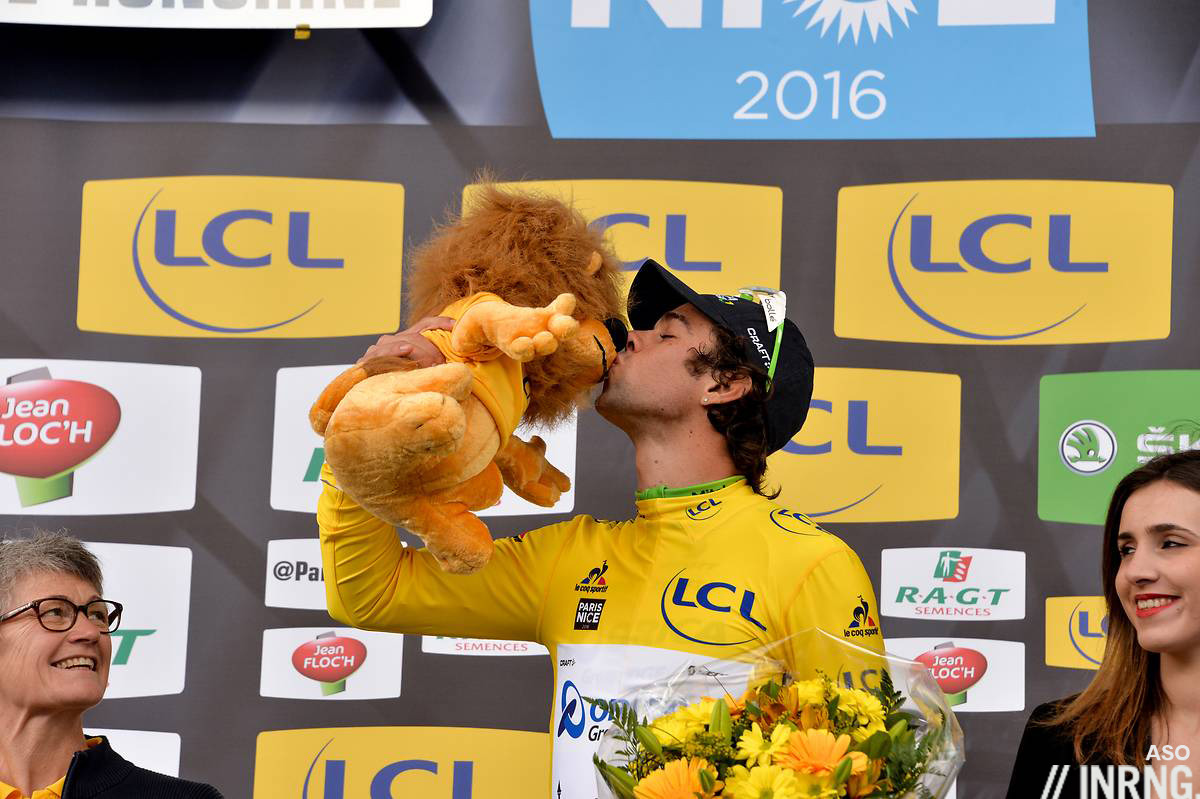
The suburban prologue provided an instant hierarchy which lasted for much of the week thanks to Michael Matthews’ surprise ride. He took the prologue by less than a second from Tom Dumoulin and then extended his lead during the week by grabbing time bonuses. Matthews has the Midas touch in his legs and seems to win high quality races just when it matters.
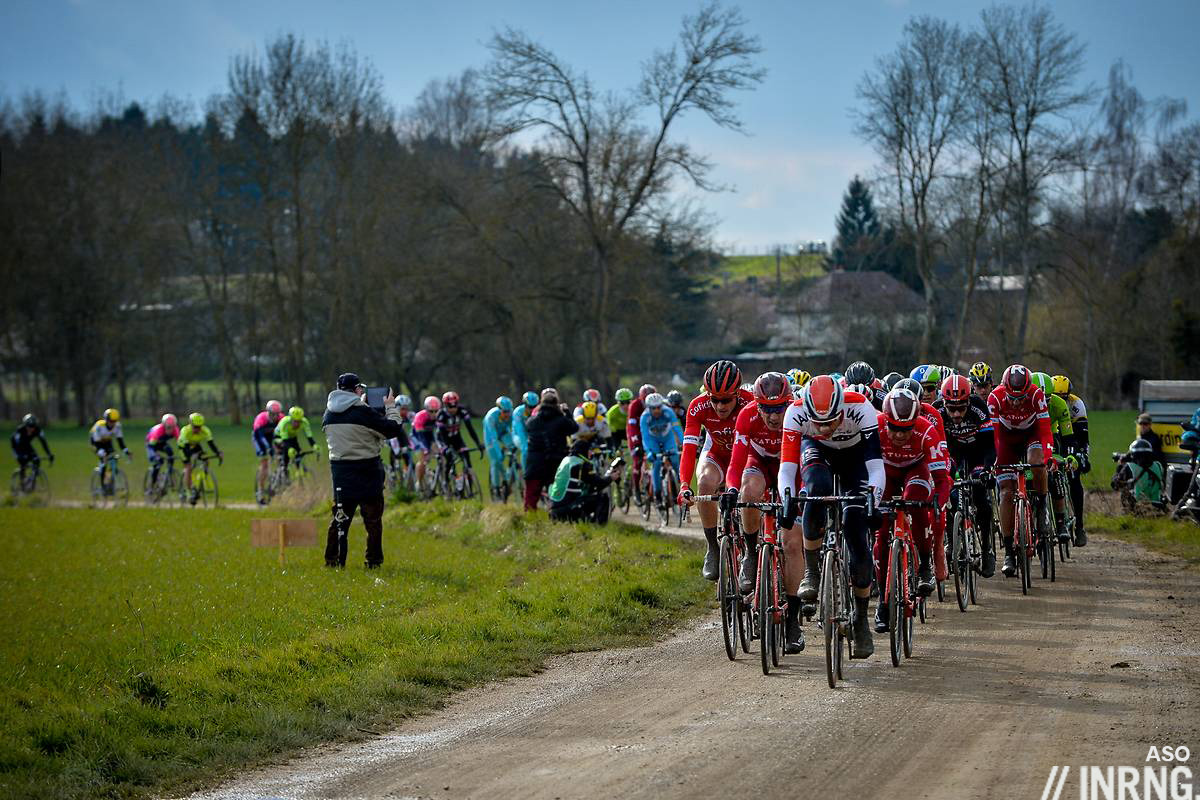
Stage 1 had the gravel roads but it was the wind that featured first. With 45km to go Team Sky set about splitting the race up. Things regrouped but it meant a harder stage, a spring classic inside a stage race. Arnaud Démare won from a long sprint while Alexander Kristoff was delayed by a mechanical and Marcel Kittel by his legs on the grinding finishing circuit.
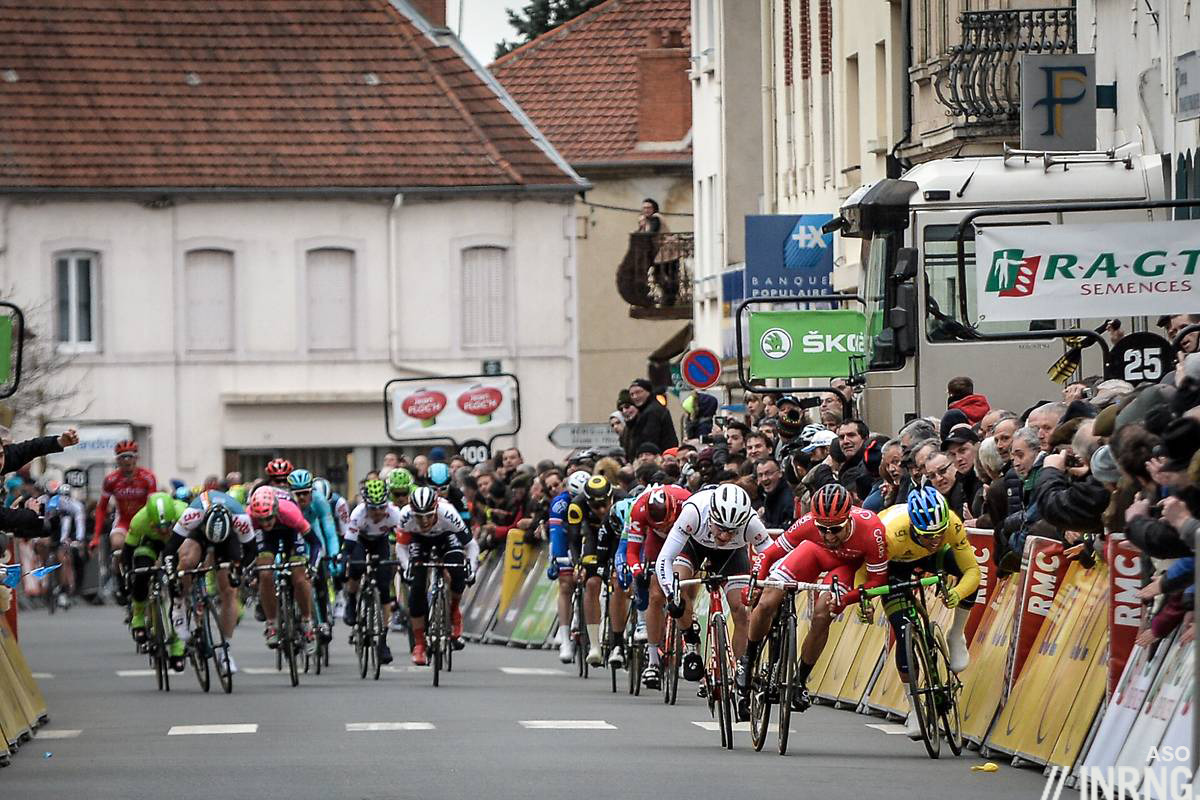
Both star sprinters missed the target this week and André Greipel was still recovering from injury. If Kristoff could cite a mechanical once he was beaten in the sprints on other days too and ended the week looking less than imperial. It left the door open for Nacer Bouhanni who promptly tried slamming it on Michael Matthews in one finish as they tussled for the stage. Matthews magnanimously shook hands over this.
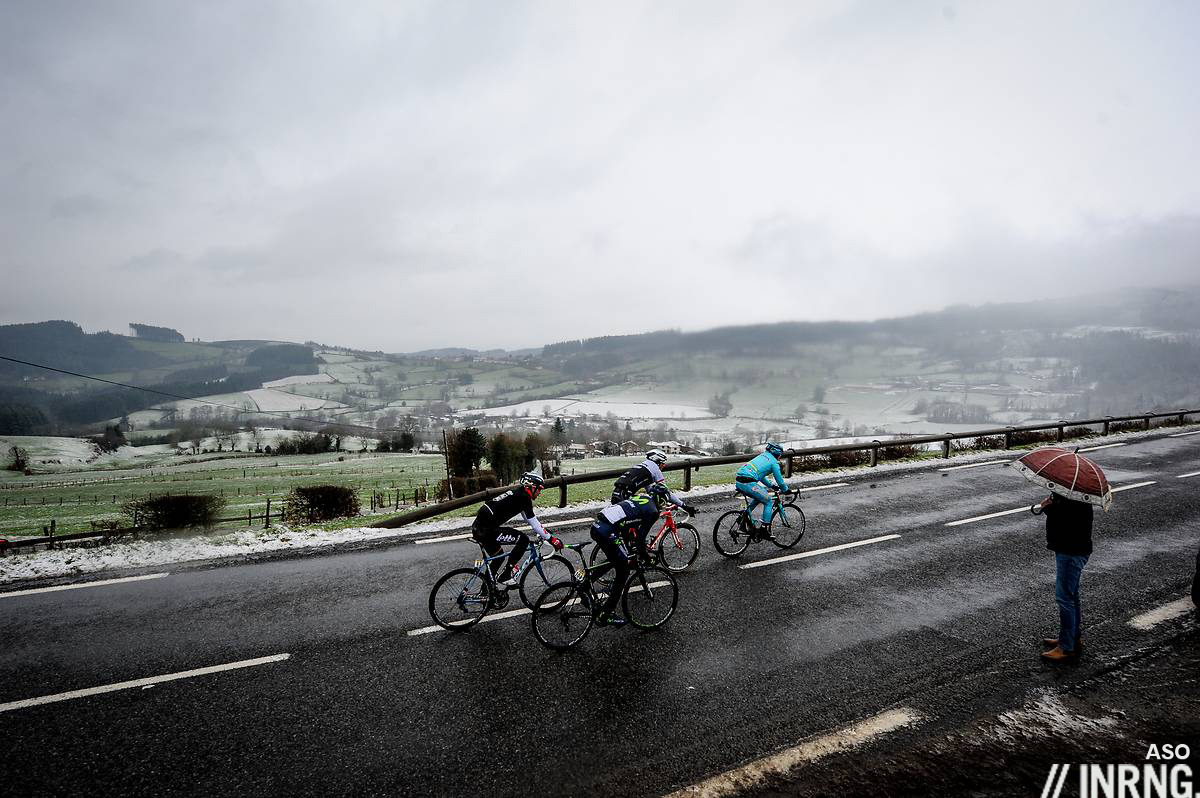
Others had shaking hands for the wrong reasons. It was a very cold start to the race. Ironically France had enjoyed its warmest winter since 1900 only to regress back to winter during the week of this race and riders endured several days of wet weather with temperatures of 2-5°C, grim conditions to ride 150-200km a day: the equivalent of a five hour acquabike session in an ice-bath. Things went from bad to worse when Stage 3 got cancelled midway, the forecast rain turned to snow and the race was stopped as it reached the high point of the Beaujolais hills. The missed Mont Brouilly finish can be regretted because it’s a good little climb that’s made for TV.
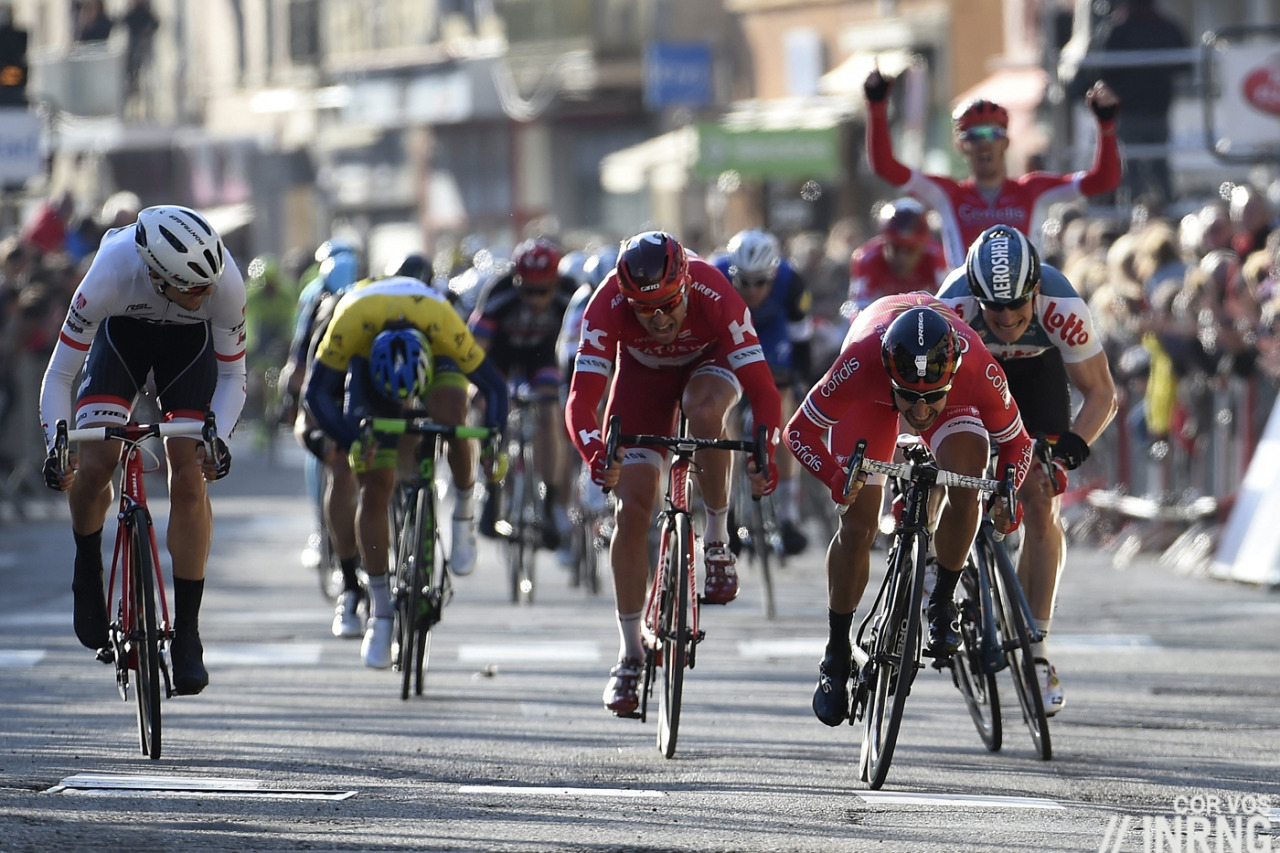
Finally the sun came out as the race reached the Rhone valley. With the sunshine logo on his Cofidis jersey Nacer Bouhanni took his stage. Alexey Lutsenko bearing the Kazakh flag which includes the sun too pulled off a solo 30km break to take a stage too. Not for nothing is he nicknamed the baby Vinokourov given his squat style and aggression, we’re bound to hear more about him later this year.
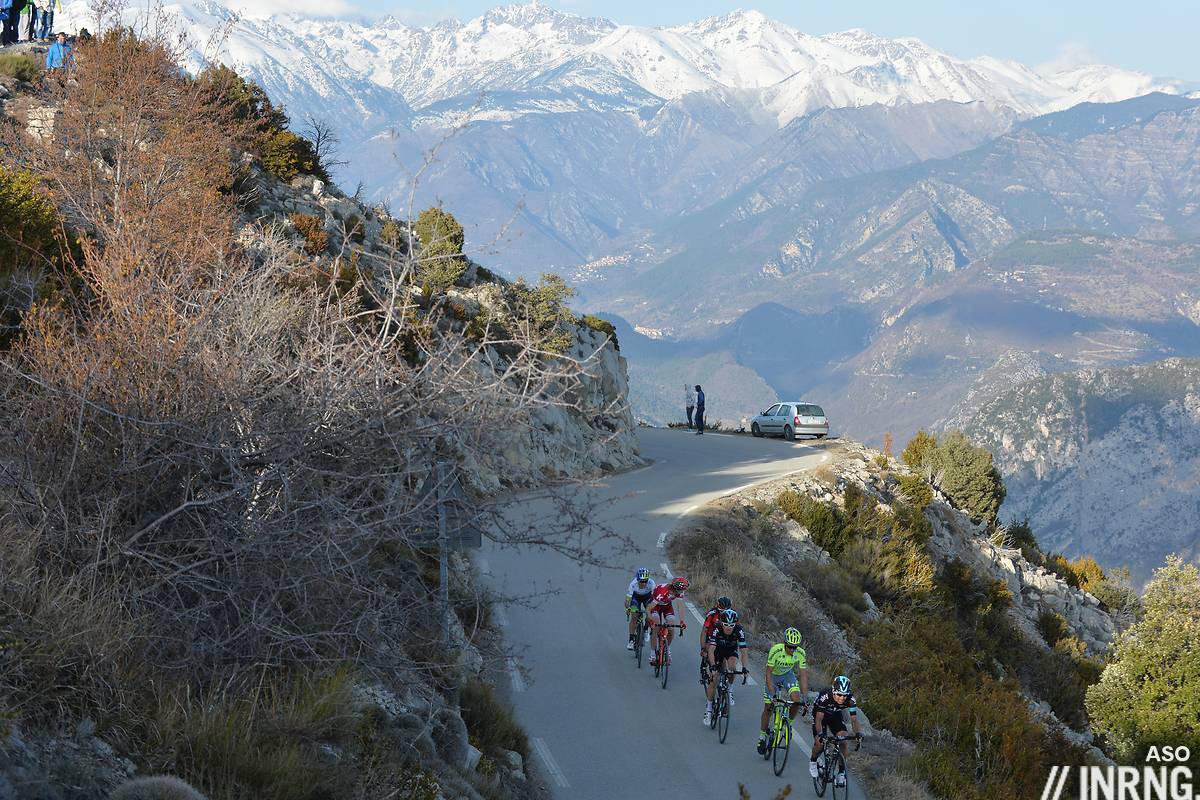
The stage to the Madone d’Utelle sanctuary was selective but not decisive. In the morning 32 riders were within one minute of the yellow jersey; it was down to ten after the stage with Geraint Thomas taking the overall lead after Tinkoff had set to work and the final stage Majka rocket was used to launch Alberto Contador. It was an uphill sprint with Majka accelerating and leading out Contador who launched his attack which reduced the group. Sergio Henao was invaluable for Geraint Thomas and in the end Ilnur Zakarin, the Stork of Tartarstan, took the stage win after tracking the lead group. It was a confirmation after his surprise riding in Romandie last year, the Russian’s big goal is the Giro and this year’s route suits him.
Stage 7, Nice-Nice, 134km
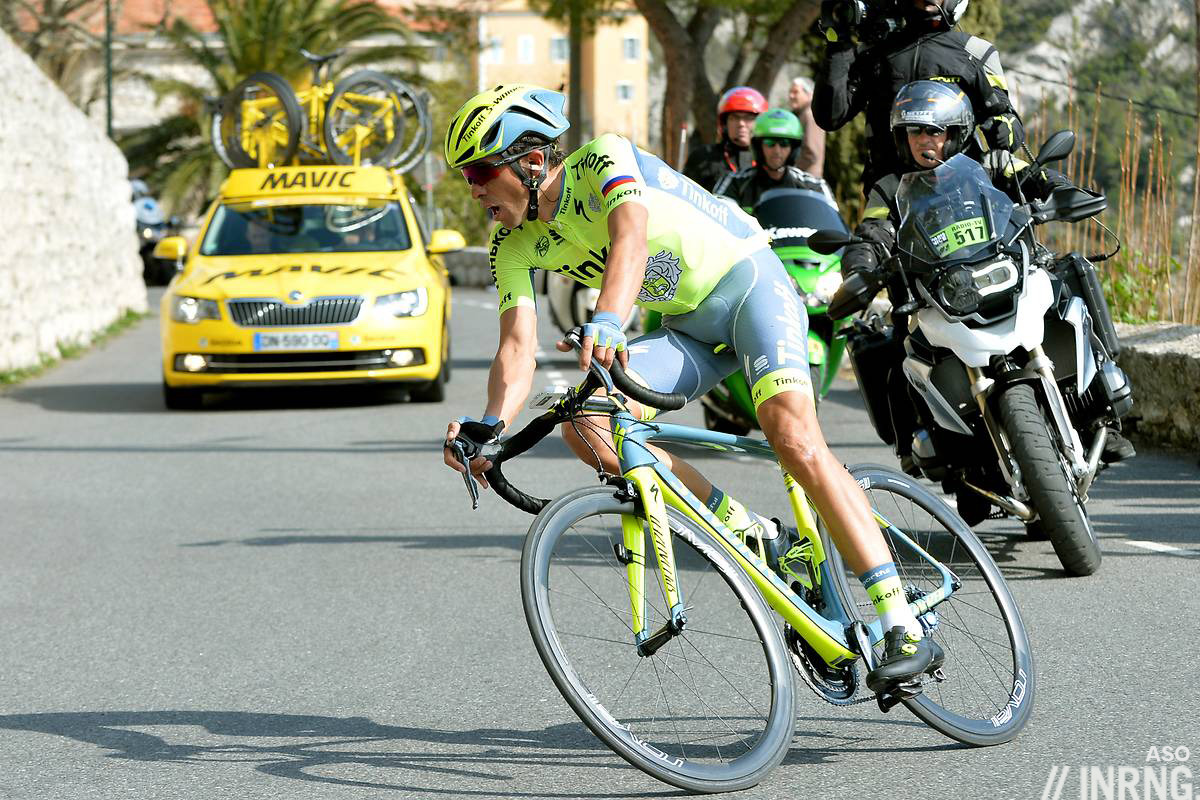
It set up the final stage for action and the terrain was perfect: a short stage packed with climbs. Alberto Contador only needed 16 seconds but set off on the attack with 45km to go. Madness? Maybe but it premeditated. The breakaway up ahead contained two Tinkoff riders and Contador was executing what we could call a “relay attack” up the Col de St. Pancrace. The idea was to bridge across and have two team mates waiting to help him. It forced Team Sky to chase and if they brought Contador back it meant that by the time they got to the Col d’Eze they’d used up riders and Thomas was tiring.
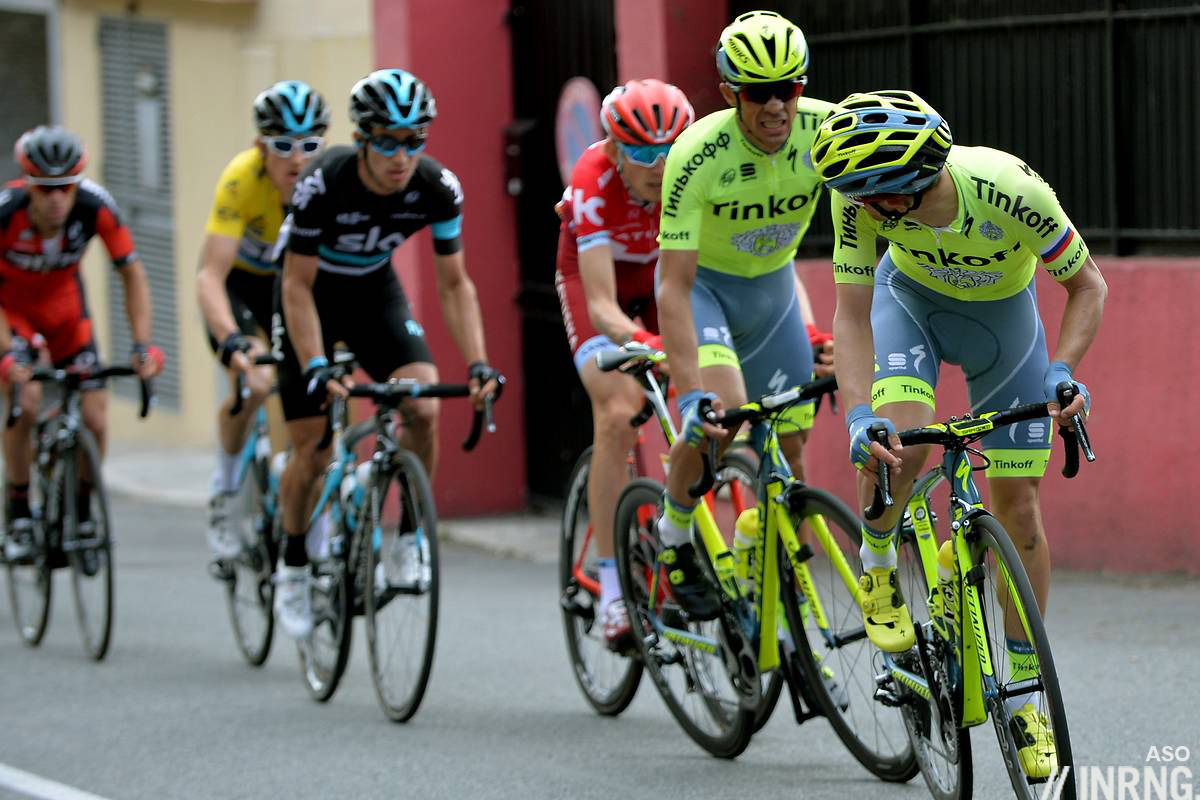
Majka did another sprint-style leadout for Contador to attack. Is this move going to become a thing on the long mountain passes or is just suitable for smaller, gentler climbs? As Contador jumped with the carnivorous rictus that reveals his full effort only Richie Porte could follow. Over the top the two picked up breakaway survivor Tim Wellens. Behind Geraint Thomas cracked, Sergio Henao was invaluable.
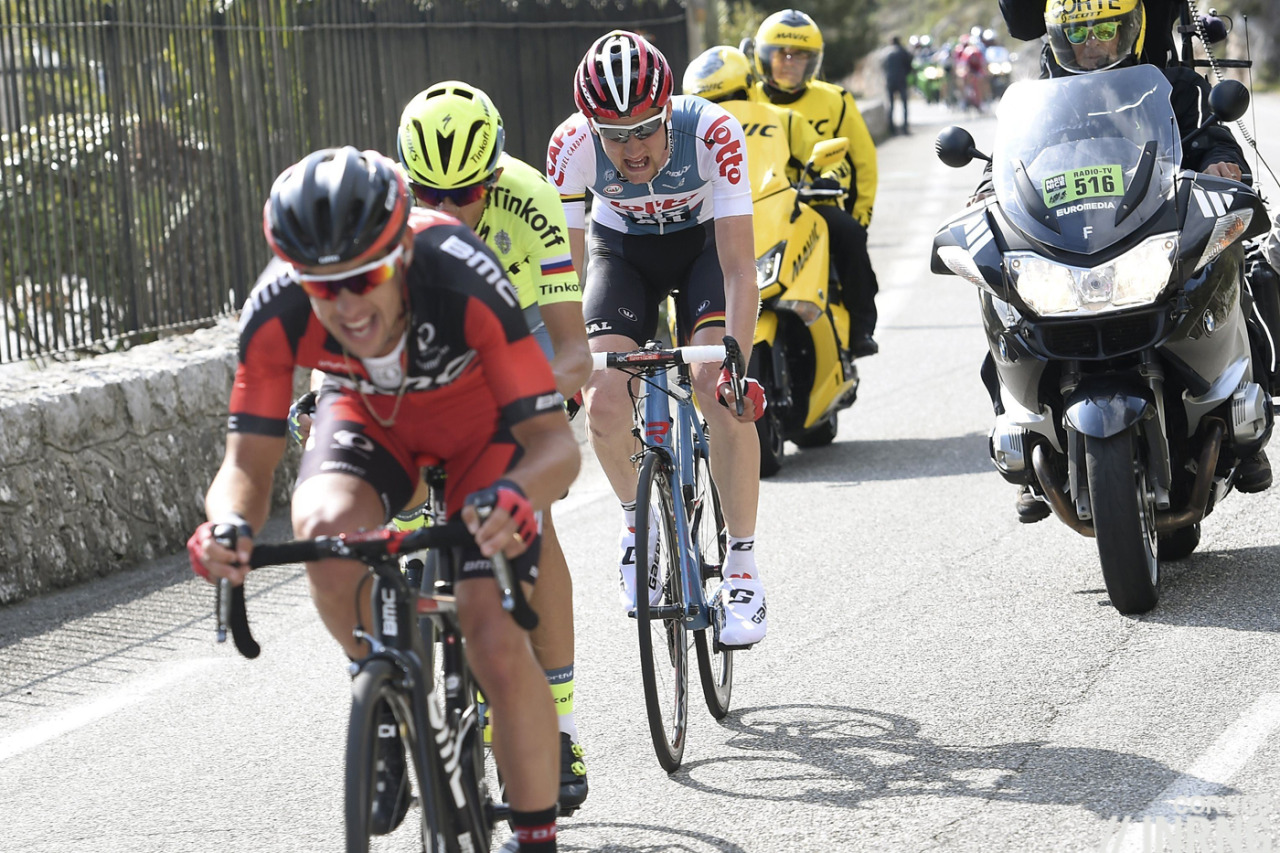
On the descent Tony Gallopin joined in the chase. It surprised some but it turns out “G” and “Gallo” share a love of rugby and, speaking to Eurosport, Thomas said he had even invited the Frenchman to watch the rugby World Cup in Wales last year. Gallopin never went but as they hurtled down the corniche he needed no invitation to chase. Besides he had every interest to help too given his top-10 place overall depended on it and, had the group up ahead caught the lead trio with Wellens then Gallopin was the stronger option for a sprint win.
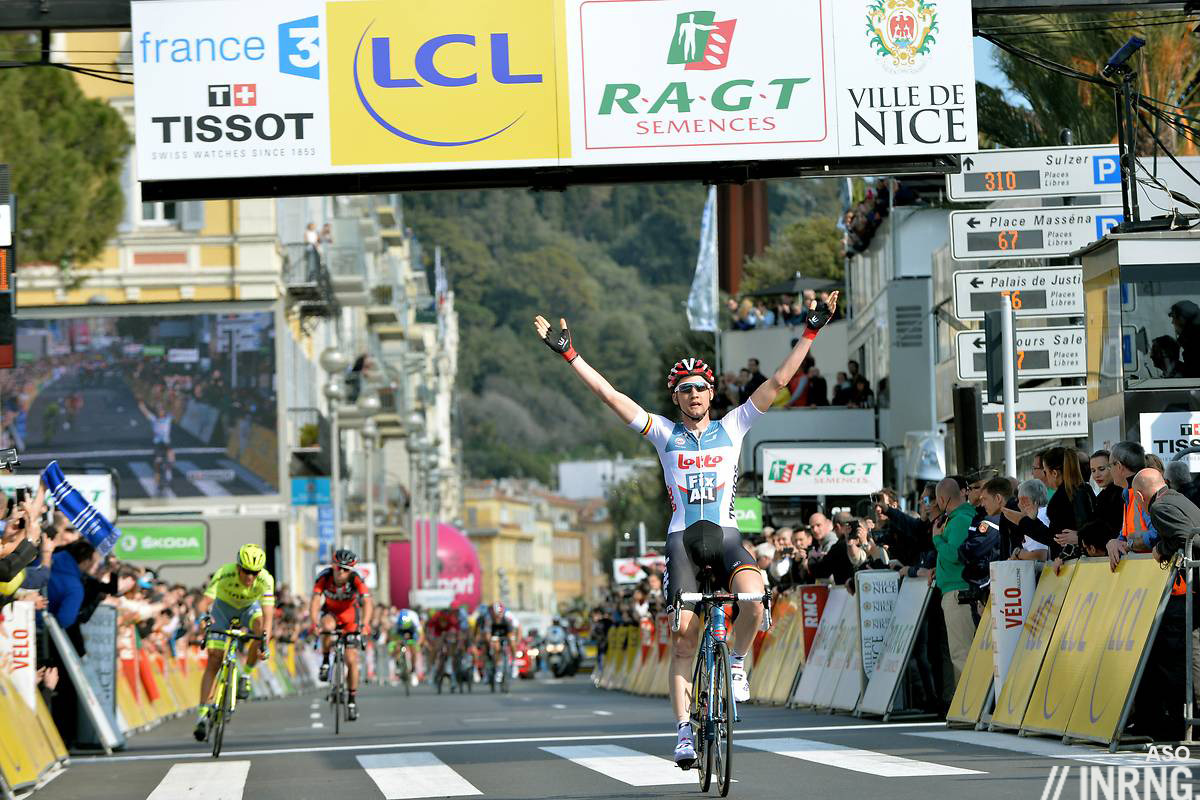
Slowly the gap began to fall with Wellens sitting on the front move but it wasn’t until the final metres that it was clear Thomas had saved his yellow jersey. Wellens won the stage and Thomas saved the day.
In a race decided by four seconds – the closest winning margin was three seconds 2008; in 1973 four seconds seperated Poulidor and Zoetemelk – Alberto Contador might rue the split in the bunch that cost him four seconds in Commentry at the end of Stage 2. Everything else being equal this wouldn’t have changed things because the race would have gone back to the prologue times and the hundredths of a second and Thomas was ahead on 0.79 seconds and Contador on 0.92.
The Verdict
Another vintage edition with action and drama all week long. After 1,290km the result was not certain until the final 50 metres. If the race was a Hollywood script the scenario would sounded contrived. The scrapped Mont Brouilly stage contributed to the second closest winning margin in the race’s history as it kept the riders more grouped than planned.
Thomas was the clear winner and tested along the way, sprinting for time bonuses on the flat stages putting his team to work in the crosswinds. But he held on with help from Henao and friends. While Wiggins and Froome were on their way to the Tour de France and Richie Porte selected as team leader for the Giro, Thomas himself is more modest for now. He’s said himself he’ll back Froome in July and see where things stand in a year or two.
Alberto Contador tried hard and should take satisfaction from his riding. L’Equipe made the point on Sunday morning that even if Alberto Contador wasn’t going to win then he was bound to try and this would only improve the race and make Geraint Thomas look better. Thomas wins the race but also beats Contador and Porte in the process. Contador ennobled and enabled the racing, he was more than the catalyst to the action but a defining part of it. But as he thinks of July there might be the nagging feeling that he couldn’t beat Chris Froome’s domestique.
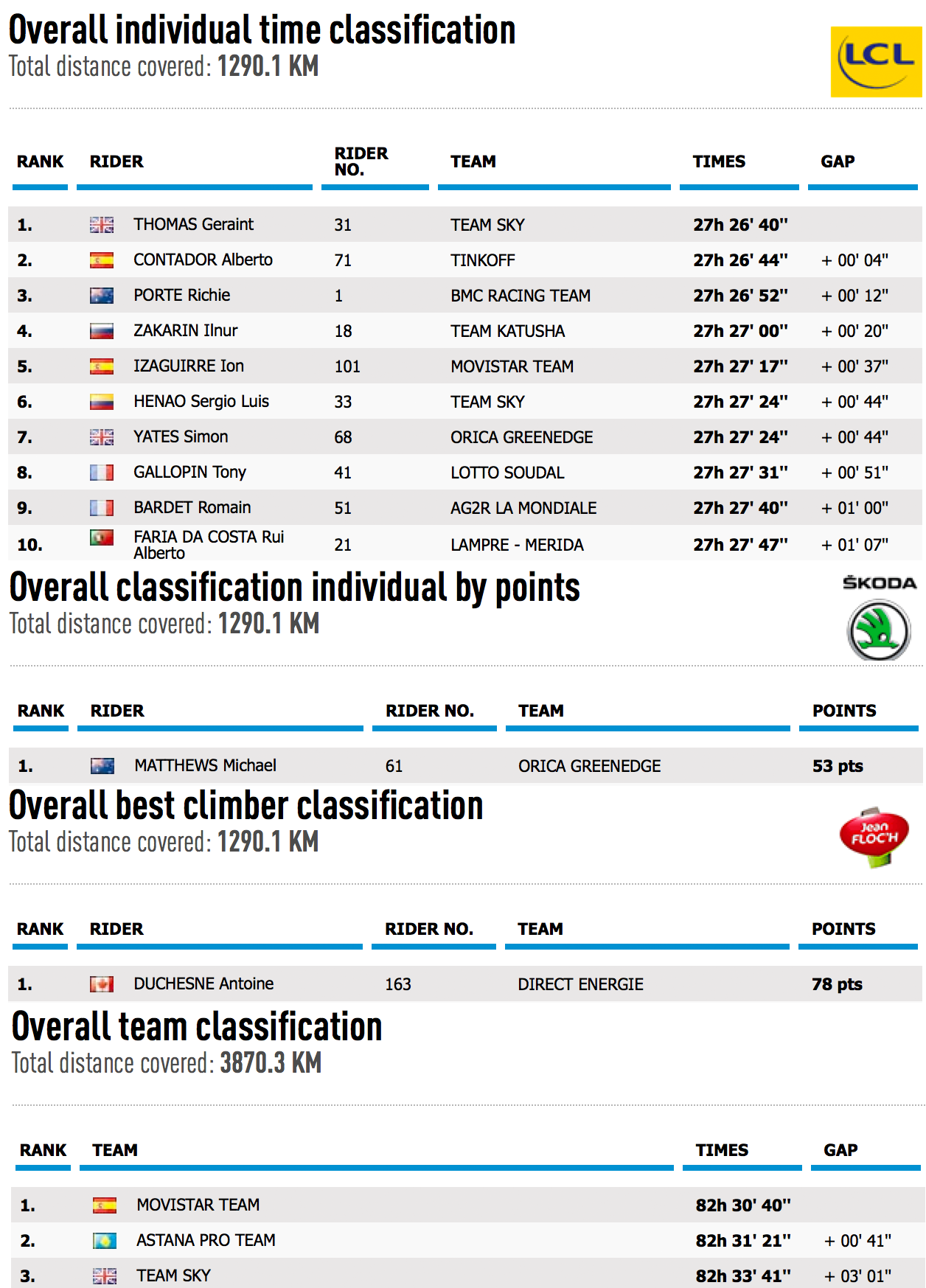
Next up… As well as Saturday’s Milan-Sanremo thoughts will now turn to the Volta a Catalunya starting this time next week. The fourth oldest stage race in the world hasn’t had top billing for some time even if it’s provided excellent racing recently as well as some snow too. The Alt de Molina and the Port Ainé 2000 ski station host the two big mountain summit finishes. How about this for an A-Z of riders: Aru, Barguil, Bardet, Contador, Dumoulin, Froome, Gesink, Hesjedal, Lopez, Kelderman, Majka, Porte, Quintana, Rodriguez, Talansky, Thomas, Uran, van Garderen and Zakarin. And that’s just the GC contenders.

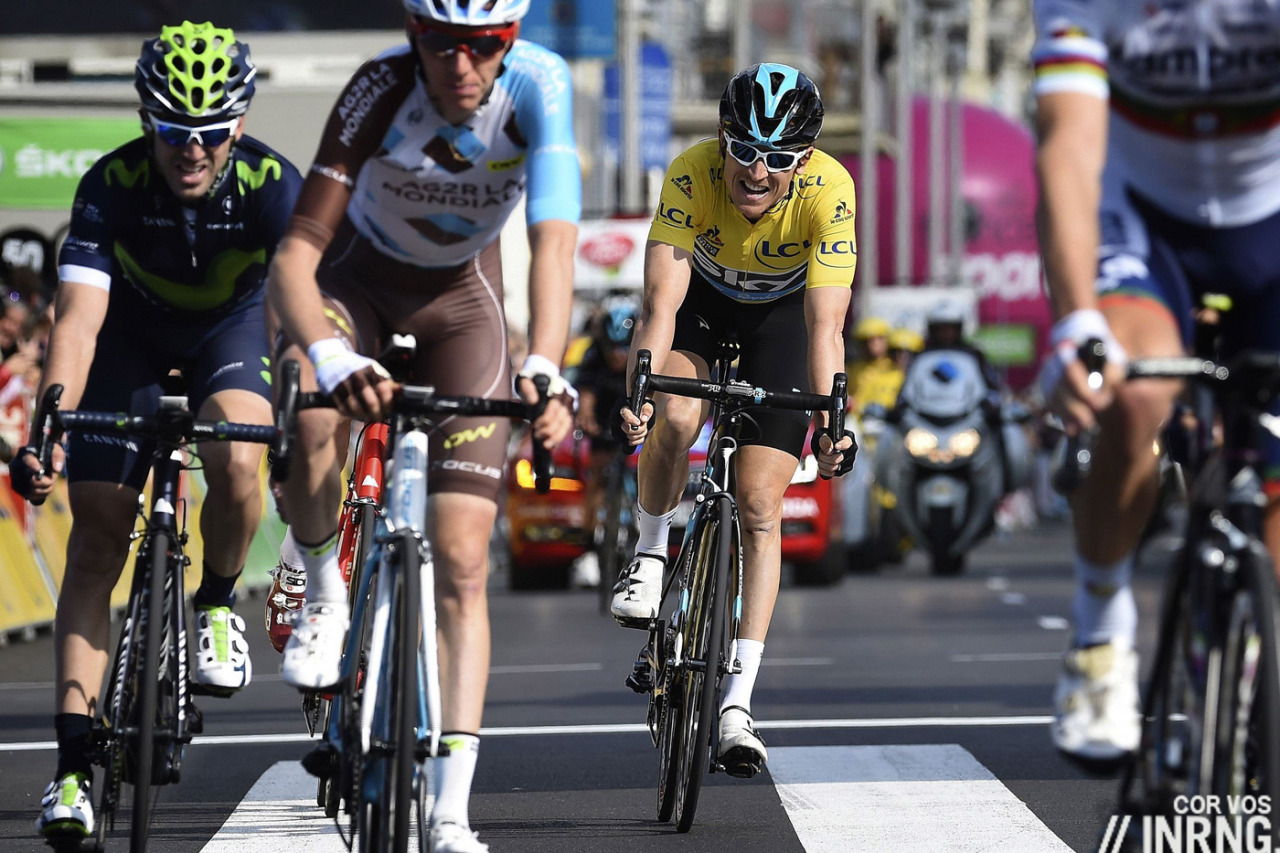
Perhaps the loss of the Mont Brouilly stage shows that sometimes stage races can be more interesting without lots of big mountain stages to separate the riders more readily.
Variety being the spice of life, I think there is room for stage races like this: the Eneco is interesting because of this novelty aspect and the 2014 Paris-Nice was great for the same reason.
Certainly, the race is a lot better without finishing with the Col d’Eze time trial.
Contador couldn’t beat Froome’s domestique (neither could anyone else), but the climbs in July will be very much bigger.
How come Milan-Sanremo has moved to Saturday?
As for a race with ‘two big mountain summit finishes’… we’ll see.
Milan-Sanremo’s long been on a Saturday, it’s only the last few years it’s been on a Sunday, in part because of the shopkeepers in Sanremo who objected to the loss of trade with the race taking over part of the town.
Thanks – I’d wondered why it had moved back to Sat. Would have thought the shops would lose more trade on Sat. than on Sun.
In Italy shops don’t lose trade on Sunday as it is illegal to “trade” on Sundays unless you have a special permit.
DMC – That’s (sadly, in my opinion) been greatly relaxed since the 2008 financial crisis. This might be why the race was able to move back to it’s traditional date and traditional finish on Via Roma. THAT part I’m happy about 🙂
a cracking race, and i think the most exciting final chase i’ve seen for ages! thanks for the daily writeups.
“Kontador ennobled and enabled the racing”. Yes indeed. How can this guy spend so much energy there? This is only Paris-Nice. Great show thanks to him – we won’t complain.
Another thing about Kontador: I have the impression that the years begin to make their effect on him (which is quite normal…). He is less explosive and looks less lean. As well, his pedaling style seemed a bit different to me: higher gearing than before.
As has been pointed out elsewhere, Contador has a lot of racing miles in those legs…that’s bound to catch up with him…
On the stage tu Urtel contadors gearshift didnt work when he wanted to attack in the last 500m when the gradient went up again – he first had to reseat after Thomas and the Katusha rider started their sprint and his gear was way to low when they approched the finishing line.
“But as he thinks of July there might be the nagging feeling that he couldn’t beat Chris Froome’s domestique.”………Ouch!
I’ll be interested to see how Contador does in the time trials, he was very good in the Valdobbiadene TT stage of the last Giro but hasn’t performed so well at other times. The Tour’s two TTs suit him as neither are long and flat tests but require climbing and lots of accelerations. But if he loses time to Froome here he will have to attack. Which should mean fireworks.
The Contador-inspired fireworks would be great.
And if these tactics could cajole / bully Quintana and Movistar to similar, it would be even better.
Remember when Talansky beat Froome Contador and Nibali and then in july it meant absolutely nothing.
Yep – but that’s why it’s just a “nagging feeling” and not a message to not show up to the Tour.
Just as Contador was beaten by Froome’s domestique, Froome’s domestique beat BMC’s top rider which, incidentally, was Froome’s domestique 🙂
Porte was almost a surprise here, he went in downplaying his chances but then did a very good prologue and was on the attack. Be good to see him in Catalunya and especially/hopefully the Basque Country soon too.
The course didn’t suit Porte as much this year. If it had ended with the traditional Col d’Èze TT then Porte would most likely be raising trophy number three. Last year, despite being in pretty hot form, Thomas surrendered 39 seconds to Porte over the 9.6km climb.
What do you mean with “traditional”? The *tradition* of the last three or four years? I’m not an expert in Pa-Ni history – hence I could well be wrong when a longer period is concerned – but in the last 20 years, I’d say that the “traditional TT” featured about four or five times. Three of which from 2012 on.
I think it’s a bit older than that. I was listening to an interview with Sean Kelly and he was mentioning this stage featuring in his many P-N wins. Anyway, my point being that if the organisers change the course then the type of riders who can flourish likewise changes. Just consider (everything else aside) all the time trialling and comparatively few mountaintop finishes that characterised the Tour de France during the Miguel Indurain years. If you’d put the 2014 route back 20 years than Big Mig would have probably not have won.
Yes he would. Only Pantani consistently had the measure of Indurain in the mountains and he would have lost minutes in the crosswinds and cobbles of the 2014 route.
Interesting debate – Agree with Augie March, many riders were much better climbers than Miguel Indurain (not just Pantani). Alex Zulle, Virenque, Chiapucci, Rominger to name a few.
Example, the 1992 Tour, where Indurain won by 4.5 minutes: He gained over 2 minutes on BOTH time trials, which were 65 and 64km, respectively. Chiapucci gained time in the mountains to bring back the gap to 2-minutes, then lost another 2 minutes in the final time trial. If the 1992 Tour had only 30-45km time trials, he wouldn’t have those massive gaps over the bunch, and if there were 5-7 mountain finishes, Big Mig would keep losing time on the smaller riders.
Have been watching those mountain stages over the winter on the turbo! None of those riders ever dropped Indurain and none of them ever gained any time on him in the mountains when it mattered. They were however given some free rein when they were several minutes down. Chiappucci (92), Zulle (95) were allowed to make long range attacks as they didn’t threaten the lead, but were then comfortably controlled once they had regained enough time to be a bit threatening. Rominger failed to get rid of Indurain at all in 1993 and was gifted at least one of his two stages by Indurain in the sprint- the main excitement of that Tour being that he made Indurain stand up on a climb, but they finished every mountain stage side by side. Virenque didn’t even make the podium when Indurain was winning and spent most of his time gurning and hanging on for grim death- I don’t remember him ever putting Indurain in difficulty, but plenty of times where he got dropped himself. So none of them gained time in Mano a Mano riding, but all of those riders lost big time to Indurain in various mountain stages over the years.
Yeah, I went and check.
We had the first 35 years finishing in Nice, then we had some 26 years with de Col d’Èze (only interruption in 1977), and finally the last 20 editions held in Nice again, apart the recent exceptions we all remember.
Not *especially* traditional, but traditional enough 🙂
Indurains Tour wins were all Extra Terrestrial – we was bigger and heavier than Cancelara and his VO2 max was a lot lower than Lemond. The way he climbed was unreal but he stopped his carier as soon as someone spoke the word ‘hematocrit’.
Having just read Sean Kelly’s Autobiography I think he mentions that either him or Stephen Roach won the time trial in P-N 9 times in a row (book not to hand so can’t check). That covers most of the 80’s so it was definitely traditional then.
As mentioned by others routes change all the time and suit different riders. I thought about this reading comments below yesterday’s preview. People seem to discount TT ability below that of climbing and also equate that to some historic ideal.
If you look back at the races of the 70’s and 80’s which I think many consider the golden era of cycling TT’s were much much longer than today and the GT/Stage race winners often gain a decisive lead in them.
The early 70’s usually had 3-4 TT’s per race, but they were short stages. Total TT km’s per Tour were between 40 and 80km.
The 1978 Tour started the trend to have massive TT’s with a 5km prologue, a 153km TTT, and THREE TT’s with 59, 52, then 72km’s. Total ITT km’s of 188km!!! Plus the TTT 153km equals total TT km’s of 341!!!
Cheers for the confirmation. As for the decline of time trialling, INRNG has covered that in some detail, including the parallel fall of the King of the Mountains classification in the Tour especially, as now the GC winner is pretty much the best climber by default.
I think this reflects that the time gaps in the mountains are so much smaller nowadays with stronger teams ensuring the GT contenders are scrapping over seconds, but a good time triallist can still create a big time gap in his favoured discipline. Therefore if you had the same length of time trialling as in the past the Tour mountain stages would become a bit irrelevant. That is how it felt in the Indurain era and whilst he was often the best climber as well at least there would have been the hope of someone beating him. I look forward to time trials being ditched altogether, but don’t think the bike manufacturers would allow that.
@Chris: “whilst he was often the best climber as well at least there would have been the hope of someone beating him” ~ are you saying that Indurain was often the best climber?
I’m sorry, that’s not at all true. My example above from the 1992 Tour where he lost approximately 2-minutes to Chiapucci per climb. Physically, he was tall, but was also a really large rider. Eg. he was 1 inch taller than Chris Froome, but a whopping 12.5kg heavier!
It was common knowledge that he destroyed people in TT’s, but limited his losses on climbs. In climbing heavy Tours, he would definitely lose a tonne of time to the GC riders of today, eg. Contador, Froome, Quintana, etc. And, he wouldn’t make up 2-3 minutes in the shorter TT’s we have today.
Often, the amount of time that Indurain (or anyone else for that matter) lost in the mountains depended a lot on how much he could afford to lose – so you can’t judge him straight from the numbers.
(As for his weight, riders were a lot bigger in the 90s for some odd reason…)
I’d like to see races without time trials – to see if it would work. You’d have to have a greater variety of stages so that it didn’t just become a climbing competition.
I was there for every one of BigMig’s Tour wins. My memory may be faulty but to me it was pretty much “mow ’em down in the chrono and hold your own in the mountains” for all of them. Same with the two Giri he won. Various mountain goats (thank gawd) livened things up with attacks that sometimes worked and sometimes didn’t, but overall they were pretty dull affairs unless you were a Spaniard.
Big Mig’s strategy wouldn’t work in today’s tours. He wouldn’t get that much of an advantage in the TT’s, and then the volume of mountain finishes would mean Big Mig would get weaker each day.
Besides, it sounds like his friend Mr. Conconi helped him over guys like Greg Lemond, Andy Hampsten, etc. Big Mig was one of the pioneers in the EPO era.
Larry T, I watched all of his wins at the time as well and agree they were boring, but you missed the second part of his strategy which was having mowed them down in the time trial he then kicked them to death in the first big mountain stage. Four of Indurain’s win were cemented by an attack in the first big mountain stage in which he finished second on the stage (Val Louron 91, Serre Chevalier 93, Hautacam 94, La Plagne 95). On three of those four he finished alongside the stage winner with most rivals well behind. In 95 Zulle won the stage solo as he was already down on GC and had escaped far out from the finish, Indurain then destroyed the rest of the field on the climb behind him. The exception was 92 which was a very odd route to celebrate the Maastrict treaty and it only had 2 proper mountain stages. The first was Sestrieres which Chiappucci won, but if a guy who is four and half minutes down on GC attacks on the first climb you let him go- it never at any stage looked like Chiappucci could take yellow and Indurain ultimately finished third on the stage having cracked Bugno and Hampsten and left most other rivals way behind. So over the course of the five tours he won he was the most consistent climber over the whole period and in each tour was at worst the second best climber in the race. That is why it was boring because he never looked anything other than really comfortable in the mountains and when he did get annoyed was easily capable of towing people back (with the exception of Pantani). I can’t speak for the Giro wins as Channel 4 didn’t show those, but Italian climbs don’t seem to suit Diesel engine climbers as well as France. The tactic would still work for him today do because the strategy of the strongest rider killing off his rivals on the first major mountain stage is still used in the majority of tour victories today as it has been in the 28 years I have been watching the race.
Chris – no real argument from me (surprise) except for the “climber” designation for BigMig. A guy (say like Tom Dumoulin today) who diesels his way up the climbs like Mig did doesn’t merit being called a “climber” in my book, even if he ends up doing the climb in the same time as someone like Pantani. Of course it depends on the route, but the “mow ’em down in the chrono and hang on in the mountains” strategy still works – too often for my liking. I still think the aero bars in the TT make this worse – the big guys with hearts and lungs to match (and I consider Froome one of these) who are stripped down to climb well would punch a larger hole in the air without aero bars, reducing the advantage of their higher wattage over the smaller climbers. Charly Mottet is an example – before aero bars he’d win the Chrono des Nations but after the big, but stripped down guys (Zulle was another in that mode) got the gift of being pretty much aerodynamically equal, simply had too much power.
Col d’Eze TT began in 1969 and has been a regular since then. Here are the years it’s been used as the last stage TT:
1969-1976
there were roadworks in 1977
1978-1991
(1992 was a Nice to Antibes flat TT instead)
1993-1995
(1996 Antibes to Nice flat TT instead)
2000
2001 (but penultimate stage)
2012-2013
2015
Geraint did well, super happy for him.
In terms of the future – him getting dropped on Col d’Eze on a relatively short stage after a week of racing doesn’t seem too good? A result of work during the week? Or was he ill? Feels like if he were up against a Quintana on a bigger mountain that would have been 3mins gone?
Also – I always expected his time trialling to be up on Wiggins’ standard one day, but it doesn’t seem to have materialised, his prologue was fine, but my thinking is if he can’t take 2mins on a time trial (with a favourable route) or climb with the best consistently, he might struggle to win a Tour without a bit of Nibali style luck?
What’s everyone’s thoughts?
Me being harsh? Was this a learning curve, could be put down to nerves?
As you said Contador couldn’t beat Froome’s domestique, which as I’ve thought for a while, would seem to make you think he cannot climb with the absolute best (Froome, Quintana, Landa?) – so if Geraint can’t climb with Contador at full flight today (not in 2007!) it’s not actually that good an indicator for a future grand tour win?
D
Wiggins is one of the 3 greatest testers of the last 10 years, so I must say that I’ve never considered the possibility of Thomas matching him. Improving on his own time trialling yes. but that’s the most that’s realistic to expect.
I think Geraint can keep on improving on his climbing, though. Whether in a couple of years he can match the top tier in France in Jul, I don’t know.
“Climbing” is not a *general* videogame-like skill, it depends a lot on the type of the climb (length, gradient) and on the context (how many climbs have been climbed before, at what pace, how many stages have been previously raced), plus other factors. With the cancelled stage and its quite different kind of climb we could have had a clearer idea. Besides, going on the attack is way harder than being towed along, especially on this sort of easier climbs.
However, 2014 was probably the last year in which Contador could reach his absolute top, age-wise, even if the Giro 2015 more than showed that even so he was at least on par with the best, when climbing was concerned. Generally speaking, I agree with irungo’s observations above.
Thomas has never looked like someone who could have Wiggins’s TT ability or, say, Quintana’s climbing ability. And I can’t see him improving either sufficiently to win a grand tour. I doubt he’d have won this race if the cancelled stage had been in it: Porte, for instance, is a superior climber on a steep hill, never mind Contador.
Contador might not be as strong as in previous years (although he had the beating of Landa and Aru less than a year ago), but he’s still one of the big three favourites for the Tour. This race did not feature many climbs nor very steep ones. And, crucially, it’s only March.
As for Nibali’s ‘luck’, staying on your bike isn’t luck (plus he’d gained a lot of time on the cobbles: who knows if it would have been enough). You can only beat the riders who are there and there are many examples of riders winning TDFs without the strongest riders of the day being present or being allowed to challenge.
Whilst I think Thomas is a very, very good rider (and I have genuine fan love for him as a Welshman), I’m struggling to believe in him as a possible TDF or Giro winner. As Davr suggests, I think he is a great all rounder, but seems to be a little short on dominance either in TT or mountain stages.
I genuinely hope he proves me and Dave wrong and wins at least one Grand Tour.
I agree, Dave. Given the calibre of riders he beat in the GC yesterday, it seems odd to be disappointed with Geraint’s performance, but dropping behind some second tier climbers doesn’t bode well. Given G has previously beaten Wiggins’s 4 km pursuit time (at a different stage in their careers admittedly), I’ve also expected him to come closer to emulating Wiggins ITT performances. In the past couple of years, I gather he hadn’t concentrated on time trialling, but I was hoping this would change as he focused more on stage races.
Contador is still a threat at the Tour – even if he has lost some of his bite from his attack. Why? Simply because he has the tactical acumen and astute racing brain; he doesn’t mind losing 30 seconds one day when his legs aren’t fully firing, cos he will find a way to attack early or repeatedly like yesterday and turn the race on it’s head with super-aggressive racing.
Thomas is still growing as a stage race rider. Winning a World Tour level week long stage race like Paris Nice, is especially a sign of proof that the decision to tailor his talented engine towards stage racing vs. Classics racing. He could hang with the big boys and even out-climbed Contador on the one summit finish of the race… it’s a step up from winning in Algarve for two years. Interesting to see if he cannot turn his top 20 at the Tour to a top 10 (top 5 target maybe?).. prior to getting green light to focus on it specifically in the absence or stepping aside of Froome.
Froome’s only one year older so I can’t see him stepping aside.
I think yesterday Thomas showed that Classics and stage races are his thing – he doesn’t have the climbing legs for a grand tour. The hills yesterday were comparatively easy.
Nobody will know for sure outside Sky but I imagine Thomas has a few kilos to drop before the Summer. As the man says, his eye is on next year anyway – I think he’s really keen to give Flanders one last go ?
Thanks for the daily low-down and the analysis above. With regard to Catalunya I only hope the organisation and, most especially, the TV coverage has been upgraded to match the star studded GC lineup. Poor in race information, images and camera work seem to be the norm for the race otherwise.
I live in hope and the line up is unarguably very exciting.
At least it shouldn’t incessantly break down as the Italian coverage does. (Not to mention showing riders standing by the side of the road for 30 seconds in the last 3k, showing the back of the peloton in the last 500m, always missing the attacking move because they’re showing a replay of nothing consequential, missing the next attack because they’re showing the repeat of the first attack they missed…)
I’ve been watching the Sporza coverage for much of the past couple of weeks and it’s excellent. Even better where it goes through youtube. Plus I like the commentator whose signature exclamation is “jongen, jongen, jongen” – it gets him through a lot of high dramas and amuses me. Though I also love Sean Kelly’s “working at it” in his Waterford accent.
We’ve had the RAI TV screen go black a time or two, but it comes back on quickly and I don’t think we miss much but I wonder about the guy in the truck who chooses what camera view to show and when. I think the “director” is the same as always but I’d swear it was some new guy who doesn’t know much about bike racing. At Strade Bianche we were at the TV corral where Alessandra DiStefano was doing interviews. As the race came to the final kms, we could hear her saying out loud all kinds of complaints about what the guy in the truck chose to show us….we could see the big screen TV which I assume was the same video one could see on RAI and he’d cut away from the action for scenery shots at crucial moments or go back to riders totally out of contention. She was very critical…so it’s not just us…but T-A seemed to be more of the same sadly.
On Eurosport we’re always told that it’s the feed for everyone that’s down: Monday’s stage of T-A we only got the last ~26km.
All directors (or whoever decides what we see) in the last few km need to do what I find myself constantly shouting at them: ‘Show the front’. Show the replays of crashes/people standing around in pain/whatever after the race.
And riders being dropped out the back are only of interest on mountains, generally.
Strade Bianche is always a problem because they like to show us Siena as we approach it. Fine, but do the lengthy shots of Siena at a less crucial time: we don’t have to be right next to it – just show it when we’re 50km away.
I don’t think Contador will be too bothered about not beating Thomas here. At the end of the day he managed to crack Thomas over a pretty short mountain pass after only a week of racing.
I love how gracious Contador was on the podium. He has a plan. So far, so good.
Quite. Thomas was able to finish ahead of Contador one day, at the price of losing ground to him the next. He may have won one of the top 1 week race, but that’s not enough to say he’s a GT contender – a dywedaf hynny’n fel Cymro.
Having said that, if he is losing too much weight for Flanders, might he be in the reckoning for LBL?
What a great week of racing, totally enthralling and with a bit of everything I thought and yesterdays stage was something special. As a Welshman it was fantastic to see Geraint prevail. Thanks as always to Inrng for the indepth coverage throughout the week that adds so much to my enjoyment.
How great is it that another cycling season is well under way. The races come thick and fast and it’s just brilliant with all to look forward to.
Thomas will have received a massive confidence boost following this result. He may not be at the same level as Froome / Quintana / Contador in the mountains but potentially i think he is one rider who still has the potential to get even better. A win like this will just add to that belief even if he was under a lot of pressure on the final day.
We are fotunate to have so many interesting and engaging riders in the peloton at the moment.
Thanks for the stage previews! Paris-Nice was an awesome race and I’m really enjoying this season’s early racing!
Brilliant racing yesterday, and all week. I love “G”, he’s a true racer, buries himself time and time again, whether he’s riding for someone else or for himself. He’s rapidly becoming a true cycling legend.
The TV coverage yesterday was totally enthralling, I was literally holding my breath, perched on the edge of my seat. Tour of Catalunya is going to be immense.
Thomas is a likeable racer for sure, and so it seems natural to push him towards the Spring Classics as a result, but the guy is 30 (I think) and so far has just the one significant win at E3 last year. To me he doesn’t seem to have quite the punch to get away in a PR or a Flanders a la Boonen/Cancellara or the sprint to win from a select group a la GVA/Sagan/Kristoff/Dege… hence I can see why his all round skills might be better suited to winning stage races. Will he make a GT leader, time will tell, but over the last 3 or so years…TDU, Bayern-R, Suisse, Algarve and now P-N, as well as his Tour last summer, he seems to be on a good progression. I guess if he holds it together this year he’ll get a crack at the Giro or Vuelta in 2017 (assuming Landa isn’t the defending champ or whatever..) and we’ll see. The Tour? – that seems a long shot (and he’d have to move or overtake Froome which seems unlikely…)
If you win E3 by dropping Sagan and Stybar, you cannot be dismissed as a possible winner of Flanders, simple as.
As for Thomas’s age, he’s the same age as GVA – and thanks to the track focus until 3.5 years ago, has less road racing miles in his legs.
Ah well, we shall see. I just dont think he can be dismissed on the Classics front for the reasons above.
He won E3 wen Sagan cracked Stybar took to long to realized and Thomas was gone. Timing and Luck, Like i wrote previously did you think Talanski was going to win le Tour because he won le criterium du Dauphiné?
If you get the timing right you make your own luck.
that’s a fair poiut Sam – I’ve never considered Terpstra quite ‘top level’ (in the way I think Stybar might become) but he got away in P-R in 2014. It’s all about putting yourself up there often enough that you make and take the opportunity if it presents itself… which G is probably capable of on a good day
The moment the race was won was when Stage 3 was ended before the final climb. Il Pistolero’s chances were greatly reduced by this. SKY can crow all they want about a “win” but let’s see how many more they can create with Brailsford’s “Slot rider A into slot B” methodology. Porte won plenty of the shorter stage races but never could come good for SKY when it really counted. I think gregari are gregari for good reason, they rarely have the commanding presence and ability to handle the pressure to deliver the big wins in Grand Tours or Monuments.
Sure SKY will keep on doing what SKY do, for better or for worse. Its the way of SKY. As opposed to what TNK do. Or MOV.
Or will TGA be able to crack it? Or FDJ…
So much to ponder….
Agree, I think cancelling stage 3 was the biggest part how the race was won.
It must be acknowledged. It is most likely that Contador would have taken more than a few seconds from Thomas over those steep slopes where drafting counts for nothing.
I agree that the stage cancellation was very significant in the overall race, but it was still very much a win for Sky, not a ‘win’.
“a la Walkowiak”…? No?
exactly!
Lutsenko…”we’re bound to hear more about him later this year”
Via results or certain UCI announcements??
Hee hee!
Great Paris Nice, great winner in Gearing and roll on the next week long stage race, my favourite type of race!
Geraint, sorry!
Actually I’m wondering if the race was won on gearing and the ability to push a big gear too. Geraint admitted he used a 54t for the descent and the footage showed he rode it hard to make up the time deficit from the preceding climb. Sure the three in front were going for it and Contador is a great descender but the flowing nature of the descent and an ability by Thomas to spin the big gear surely had some influence on the result.
great riding to win the polka dot jersey by the young Canadian Antoine Duchesne, he rode a pretty good race and was in at the right spots to pad his points lead.
Yes, he did very well and I was going to mention him but the piece was getting long already. He did a long breakaway on one stage and then went in the right move again for the next two days and had the energy to take the points too.
Great racing at this year’s P-N, and also at the T-A. But the results might have been different without the cancellations of the mountain stages at both races. Nonetheless, GVA (even if you doesn’t win the ITT) and G are in excellent form. Looking forward to great racing from them at all the upcoming classics–and with Spartacus in his final year,…let the games begin! Oh, and let’s not forget Sagan’s run of perennial seconds, which has already begun to bloom this season–surely he will want to snip it off at the bud in the early spring.
My view (based on, er, nothing) is that Sagan will be after Paris Roubaix, so there might be an element of ‘timing his form’.
This year is make-or-break for GVA. He NEEDS a monument win to fulfil his undoubted potential. Guessing Flanders will be his best shot, then P-R. I would love to see him get the win in the Roubaix velodrome.
Two key moments:
1. Contador’s shifter failed on Stage 6, leaving him the small chain ring
2. Thomas’ (and Henao’s?) choice to use 54T chain rings for the descent on chain 7
Evidence for both on the Twitter
Contador ennobled and enabled the racing, he was more than the catalyst to the action but a defining part of it. But as he thinks of July there might be the nagging feeling that he couldn’t beat Chris Froome’s domestique.
Love this – great commentary thanks
Even if you are not a Contador fan you always take your hat off to him, even when he loses, because you know he has raced to the absolute limit of his ability.
will miss him if he quits at the end of this year for sure…
… on the other hand I’m not sure I want to watch him slip down the pecking order as his powers diminish. Some guys just belong at the top.
Panache and guts show by both riders. Contador on the ascent and Thomas on the decent. Chapeau to both.
The length of the comments seem to get longer as the quality of the racing increases or stays at a competitively high level! Hope all stay healthy as the season has been exciting.
We hope for more, thanks everyone
I really do fancy Michael Matthews for MSR this weekend. Sagan just doesn’t quite seem to have hit the right form yet, and over the distance I feel Matthews has the beating of Kristoff.
I would say that distance is Kristoff’s speciality. Like you say though Matthews is flying and should definitely be counted in Sean Kelly’s ‘group of big favourites’!
Nibali has threatened to sue Matt Brammeier for his tweet that called Nibali as a “narrow minded, selfish moron”.
You can sue for that?
I’m going to make a fortune.
And with one move, Nibali makes Brammeier seem like the reasonable one. No idea if you can make out a defamation claim for that sort of insult in Italy. You’d get nowhere with it in the UK as “mere vulgar abuse” isn’t defamatory.
Whatever happened to Aru’s threat to sue Greg Henderson?
Like most threats to sue, the threat is considered – by the person making it – as ‘enough to prove that I am right’.
It’s known as ‘Trumping’ in legal circles.
Brammeier still doesn’t seem like the reasonable one, though.
Nibali’s lawyer said from the beginning that if the guy apologises, it will be enough.
On the contrary, Aru’s lawyer filed the sue despite the cancellation of the twitt and apologies from Henderson, but I guess it can take even years to get a result (that’s what happened when Nibali sued a journalist – and eventually won).
In Italy, as long as I know, much depend on the impact that the insult can have. It’s deemed quite different to insult someone in a context with a lot of public or in a more private situation. The effect on some “colleagues”, as proved by T. Martin retwitt, could play against Brammeier. OTOH, Brammeier can play the linguistic card saying that “moron” isn’t that much of an insult. However, receiving a “mere vulgar abuse” would be enough to win some money, in Italy… But I’m basing my opinion on cases which I have heard of, I’m no expert in the field.
Aru taking it to court would be fair enough – he’s been called a cheat.
The idea that calling someone names can lead to legal action is, frankly, preposterous.
Apparently, the true moron in this has apologised (although I don’t know about Martin).
Thanks for the update, and my impression is that the wheels of Italian justice turn slowly, so we shouldn’t expect resolution any time soon. Again, in the UK, an immediate apology and cancellation of the publication wouldn’t leave much to argue about, and you’d be at risk of the court awarding costs against you if you carried on unreasonably.
Interesting that an abuse/insult is enough to found a defamation suit in Italy, though we’ll see what actually happens. Brammeier seems to have responded by saying that he has no particular issue with Nibali, just frustration that a senior rider is undermining a decision made with the participation of the riders as a whole. That may be enough to satisfy Nibali now they’ve all had a chance to calm down (or enough to make a case a waste of time).
The moment was when Geraint put a 54 chainring on.